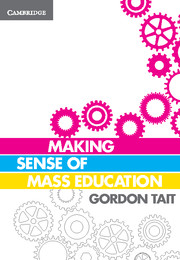Book contents
- Frontmatter
- Contents
- Acknowledgements
- INTRODUCTION
- PART 1 RE-ASSESSING THE THREE PILLARS: MODERN AND POSTMODERN SOCIOLOGIES OF EDUCATION
- PART 2 THE FOUNDATIONS OF AN ALTERNATIVE APPROACH: EDUCATION AND GOVERNANCE
- CHAPTER 4 GOVERNANCE
- CHAPTER 5 SUBJECTIVITY
- CHAPTER 6 PRE-ADULTHOOD
- PART 3 CULTURAL CONTEXTS OF CONTEMPORARY EDUCATION
- PART 4 PHILOSOPHY AND MASS EDUCATION
- CONCLUSION
- References
- Index
CHAPTER 4 - GOVERNANCE
from PART 2 - THE FOUNDATIONS OF AN ALTERNATIVE APPROACH: EDUCATION AND GOVERNANCE
- Frontmatter
- Contents
- Acknowledgements
- INTRODUCTION
- PART 1 RE-ASSESSING THE THREE PILLARS: MODERN AND POSTMODERN SOCIOLOGIES OF EDUCATION
- PART 2 THE FOUNDATIONS OF AN ALTERNATIVE APPROACH: EDUCATION AND GOVERNANCE
- CHAPTER 4 GOVERNANCE
- CHAPTER 5 SUBJECTIVITY
- CHAPTER 6 PRE-ADULTHOOD
- PART 3 CULTURAL CONTEXTS OF CONTEMPORARY EDUCATION
- PART 4 PHILOSOPHY AND MASS EDUCATION
- CONCLUSION
- References
- Index
Summary
This chapter argues that the modern school isn't just about ‘education’, but has a big role to play within contemporary governance. It is tempting to think that the process of teaching children has always been pretty much the same, and that mass schooling emerged as a result of greater concern for the wellbeing of the young. The evidence paints a somewhat different picture, wherein mass schooling formed a crucial component of a new form of social regulation, one based upon an increasing focus on individuality, one where the school subtly conforms to the requirements of the state, and one where the disciplinary management of the population is made possible through continual surveillance, and through the close regulation of space, time and conduct.
Myth #1 Society has always been simply a collection of individuals
Whether 300 years ago, or in the present day, we have always regarded ourselves as individuals, part of a population, but each of us is different in thousands of ways.
Modern governance – and indeed individuality itself – really only became thinkable when we changed from being a mob, into a population; a change that came about as a result of new techniques of information gathering, allowing for the construction of endless new categories of difference. Importantly, with each new category, came new possibilities of intervention and regulation.
Myth #2 Schools are primarily about education, not regulation
Schools aren't about the exercise of power, or about population control, they are simply about giving children an education.
With the demise of sovereign power throughout the eighteenth century, liberal forms of governance sought less intrusive ways to regulate the population. One of the most effective strategies was to ‘govern at a distance’ through relays like the mass school. All the required capacities could be inculcated into the population without the government seeming to be involved.
- Type
- Chapter
- Information
- Making Sense of Mass Education , pp. 81 - 98Publisher: Cambridge University PressPrint publication year: 2012



